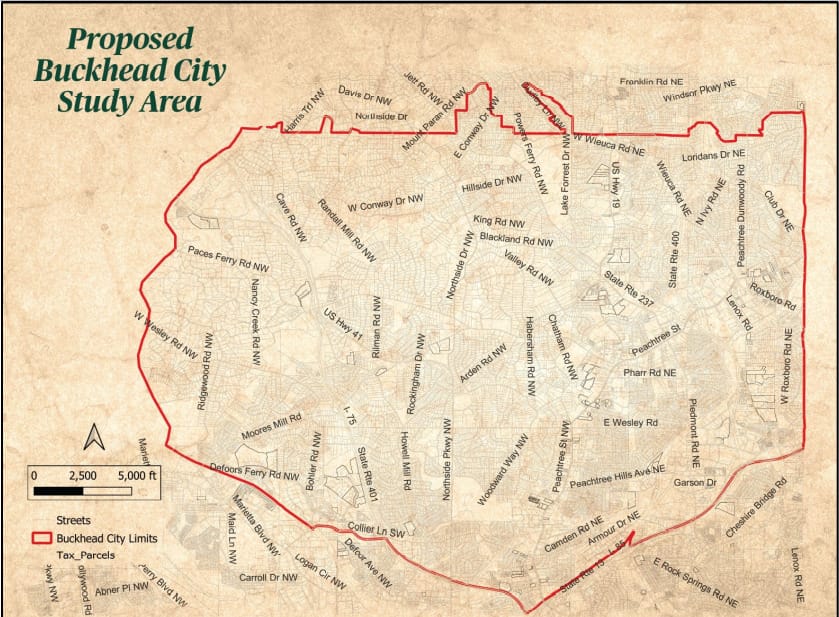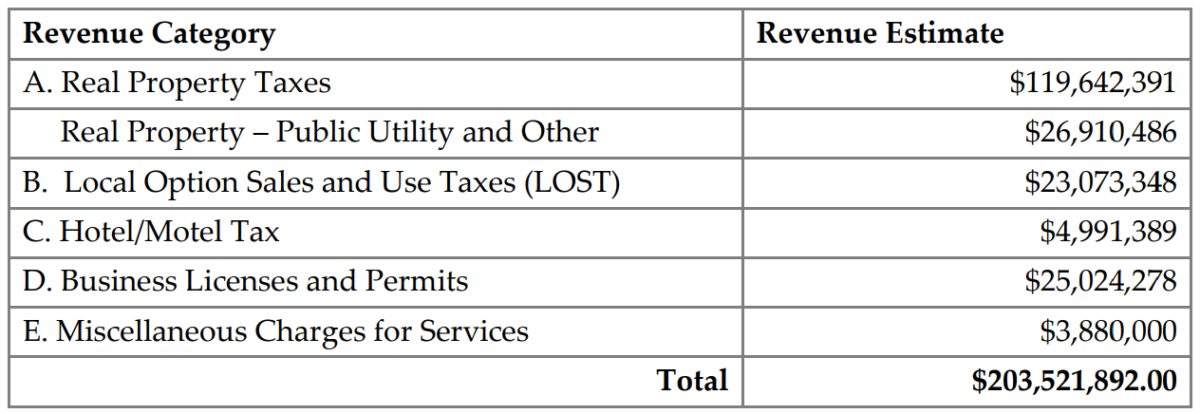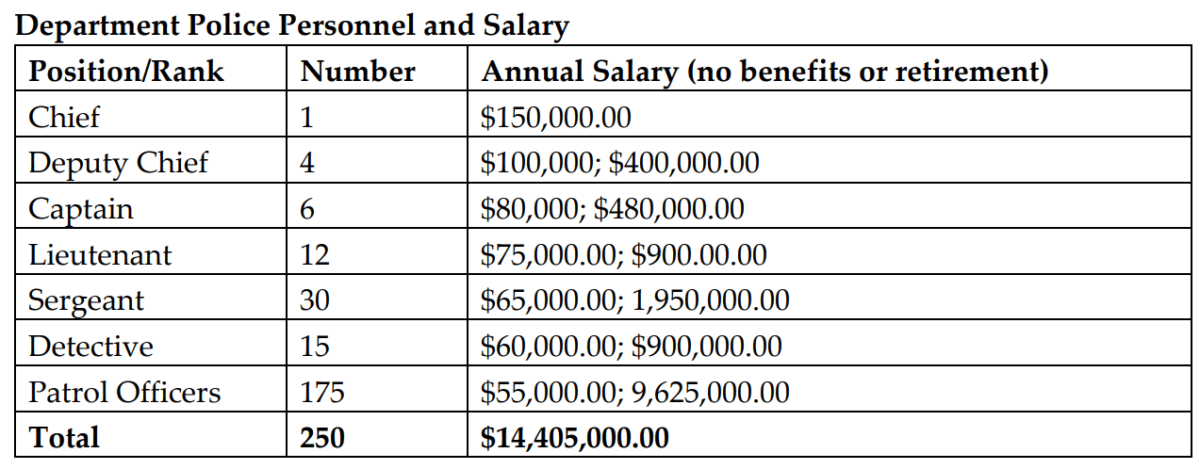“Buckhead City” would be financially feasible in sheer revenue and expenditure terms — including with a new, larger police force — according to a university-conducted study legally required as part of the cityhood effort.
The feasibility report, released Sept. 13, allows state legislation to continue moving toward the local Buckhead City Committee’s goal of getting a binding cityhood question on the November 2022 ballot. The report estimates Buckhead City would have an annual budget surplus of around $113.6 million. But it cautiously notes that it does not endorse cityhood and does not address other financial and “social, political, and governance issues.”

“We’ve been saying all along that taxes paid to the City of Atlanta have not generated a fair return for Buckhead in terms of city services,” said Bill White, CEO of the BCC. “This feasibility study demonstrates that point inarguably, mathematically and once and for all. Given the same tax revenue, the administration of Buckhead City would deliver more and better services to the people of Buckhead, starting with a highly effective and properly compensated police force with a minimum of 250 officers.”
Committee for a United Atlanta, a group advocating for Buckhead to remain part of the city, did not immediately respond to a comment request.
With the study complete, the stage for political battle is set, which appears likely to clash along familiar lines these days: Republicans vs. Democrats and big business, and the governor vs. Atlanta. The study follows the BCC’s release of an internal poll of Buckhead residents showing around 61% in favor of holding a cityhood vote, but with a strong partisan divide on the issue.
In a BCC press release, the feasibility report was praised by the three state lawmakers who are shepherding the legislation in the General Assembly — all of them Republicans who do not represent Buckhead or Atlanta. They include Rep. Todd Jones of Cumming and Sens. Brandon Beach of Alpharetta and Clay Dixon of Buford, who is also one of the floor leaders for Gov. Brian Kemp, meaning he promotes legislation on Kemp’s behalf.
“There is now no question – and it is no surprise – that a Buckhead City would be financially feasible,” said Dixon. “People deserve to live without fear as they drive down the road or walk in a mall. The City of Atlanta has failed in epic proportions, and Buckhead has every right and reason to form a city with a strong police force and real leadership.”
“After reviewing the feasibility study, it is crystal clear that Buckhead City will help make the citizens of Buckhead safe and allow them more control of their own destiny in a fiscally responsible way,” said Beach.
“Self-governance is a bedrock principle of our republic,” said Jones. “The residents of the proposed Buckhead City should be given the opportunity in November 2022 to vote on incorporation.”
For a full copy of the report, click here.
What the study says — and doesn’t say
Under Georgia law, the General Assembly cannot consider legislation about the incorporation of a new city unless a study shows it to be financially possible based on the tax base and comparisons with other local cities. Several prominent universities that typically do such studies, including the University of Georgia, declined to perform the Buckhead City study, mostly for undisclosed reasons, though UGA said it was too busy. The BCC finally got it done by the Center for South Georgia Regional Impact at Valdosta State University, which, as the name suggests, does not usually study Atlanta issues.
Titled the “Fiscal Feasibility Analysis of a Proposed Buckhead City,” the report is solely focused on estimated revenues and expenditures. By that measure, the center’s staff “have concluded that the City of Buckhead [sic] is likely fiscally feasible,” the report says.
The report offers no opinion for or against cityhood. And, its text adds,
The report does not address other criteria that are also important to the new city[,] including social, political, and governance issues.”
“It is important to note the limitations of these types of studies,” the report further cautions. “They cannot predict every possible variable that may occur in the future with a potential impact on the costs of government. Additionally, the study is not intended to be a model budget for a new city. A newly elected city council will endeavor to represent their constituencies and will have a set of priorities that may impact both taxing and spending patterns.”
Another side note in the report is that the formation of a new city would require a renegotiation of the distribution of Fulton County’s local special option sales tax revenues to cities.
Revenue and expenditure estimates
With all those caveats, here’s the report’s estimates — which it says are conservative on revenue and high for expenditures:
- Expected annual revenue: $203,521,892
- Expected annual expenses: $89,921,825
- Expected annual surplus: $113,600,067
“Subsequently, Buckhead City could offer property owners a significant reduction in property taxes, enhanced and/or new services for city residents, or a combination thereof,” the report says.
One asterisk in the report: “These costs only account for annual costs and do not estimate any startup expenses.”
One asterisk not in the report is that the new city or its citizens likely would be paying for other services outside of traditional medium-city departments. The BCC said in a press release that it intends to keep using the Atlanta Public Schools system and the City of Atlanta water and trash collection, among other services.
The estimates were based on current property valuations and “applicable millage rates,” and comparison with the budgets of Fulton County and the cities of Atlanta, Brookhaven, Roswell, Sandy Springs and South Fulton. Roswell and Sandy Springs — which are similar in size to the proposed Buckhead City — were specifically used for expenditure estimates. The estimates were made by calculating the two cities’ per-capita spending and multiplying the average by Buckhead’s 2021 population and applying it to services “typically” provided by such cities.
Police department spending is an important and relatively detailed part of the report, and is also politically important, as crime concern is the primary driver of cityhood separatism. The specific proposal analyzed is a 250-member police force with patrol officers’ pay set at $55,000 a year — which would be more officers and higher basic pay than the Atlanta Police Department offers Buckhead today.
The report says that police budgeting is so complex with many variables that the analysis “deviates” from typical estimation methods. It settled on a “a blended approach” combining per-capita spending and “potential workload assessment.”
The police budget estimate totals $20,080,931. Of that, $14.405 million is police salaries, not including benefits or retirement.
The estimates for some other city departments include:
- Fire Department and EMS: $14,053,205
- Public Works: $20,666,417
- Parks and Recreation: $9,339,721
- Community Development: $3,860,736

Buckhead City would be roughly 25 square miles and have a population around 103,867, according to the report. That makes it roughly 20% of the City of Atlanta by population, land area and number of parcels, the report says.
A major concern of cityhood opponents is the financial consequence to the rest of Atlanta. The BCC claims — though the report does not mention or support this — that the removal of Buckhead would balance out for Atlanta. “Any reduction in funds to the City of Atlanta due to the formation of Buckhead City will be offset by the reduction of responsibility for police, roads and parks,” says the BCC website. “A smaller Atlanta … a smaller anything … is easier to manage.”







